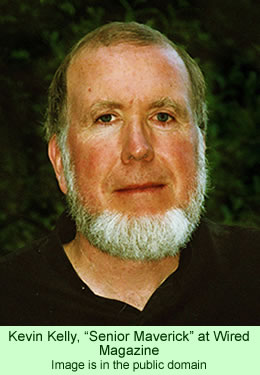Kevin Kelly, the founding executive editor of Wired Magazine, will be the featured speaker this evening at an international conference titled “Amish America: Plain Technology in a Cyber World.” The title of Mr. Kelly’s presentation, scheduled for 7:00 PM Eastern Daylight Saving time, will be “What the Amish Can Teach (and Learn) from Nerds and Geeks.” The three-day conference will be held at Elizabethtown College, Elizabethtown, PA.
 Mr. Kelly has maintained a personal interest in the Amish for more than 30 years. The abstract for his talk at the Plenary Session this evening indicates that he will explore “the collective steps that Amish communities use to evaluate their choices, test and experiment, tolerate loopholes, and prohibit or accept new technology, which provide valuable lessons for the fast-forward nerds and geeks.” His talk, plus four others during the conference, will be available for free live video connections via the conference website.
Mr. Kelly has maintained a personal interest in the Amish for more than 30 years. The abstract for his talk at the Plenary Session this evening indicates that he will explore “the collective steps that Amish communities use to evaluate their choices, test and experiment, tolerate loopholes, and prohibit or accept new technology, which provide valuable lessons for the fast-forward nerds and geeks.” His talk, plus four others during the conference, will be available for free live video connections via the conference website.
Kelly will go on to argue that the processes by which the Amish evaluate technology can be of more interest than the technologies they ultimately adopt. On the other hand, they themselves often don’t appreciate the benefits of technologies. He told a Lancaster newspaper that “short of an asteroid strike, there is no way civilization goes back.”
So even if modernity marches on, the Amish do too, he adds. He speculates, at least to the newspaper, that modern society might someday rely heavily on the Amish for food supplies. On the other hand, advances in silicon chip technology, as well as modern chemistry, have affected the Amish of Lancaster County. But they are the ones who make the choices to minimize their involvement with technology.
He has written that some Amish love to tinker and invent labor-saving devices, even while they shun entanglements with mainstream technologies. He calls their approaches, “Amish electricity,” when they use diesel powered, compressed air systems to run tools in their shops and, in some homes, refrigerators in the kitchens.
Another prominent speaker at the conference, which includes over 100 presenters, will be Karen M. Johnson-Weiner, from the State University of New York. She will speak at 10:30 tomorrow, Friday, on “A Tale of Two Kitchens: Gender and Technology in Amish Communities.” Her talk, which will also be available for live video feed from the conference website, will explore the ways Amish ideas about gender influence their acceptance of new technologies. At the same time, she will discuss how Amish adoptions of new technologies and attendant work habits affect their own notions of gender relationships.
Ms. Johnson-Weiner tells the Lancaster newspaper that some of the Schwartzentruber Amish in New York state take a harder line than most on the adoption of modern devices. “Not only do they not have cellphones,” she says, but “they will not even talk on a phone.” They believe in interacting without technology, which forces them to work closely with one another.
Another featured speaker will be Alan Shuldiner, a professor from the School of Medicine at the University of Maryland. His talk, at the end of the conference on Saturday, at 11:15, will be titled “Amish Participation in Medical Research: A Partnership of Trust and Mutual Benefit.” It too will be available to watch from the conference website.
The founder and director of the Amish Research Clinic in Lancaster County, Shuldiner will provide an overview of the ways the Amish accept medical technology, which is used in scientific research projects. He will discuss issues relating to Amish health, and their participation in medical research projects.
He told the Lancaster media that he first drove up to the Amish community in Pennsylvania in 1993 and began testing for diabetes out of his own car. He got to know the people and began building up mutual trust, which helped foster the medical research clinic. He said that there may appear to be a dichotomy, considering the Amish skepticism about technology, but he feels that such concerns are misplaced. Medicine does not actually threaten their culture.
Shuldiner concludes that the Amish “believe if they can participate in research, they can benefit all of mankind.”